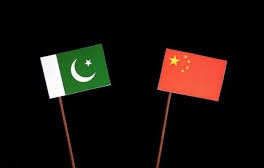Over half of Chinese enterprises listed on Fortune 500 have operations in Pakistan

China Economic Net
Beijing: More than half of Chinese enterprises listed Fortune 500 have invested or conducted business cooperation in Pakistan, demonstrating Chinese companies’ confidence in Pakistan’s future economic development.
According to Annual Fortune Global 500 List released on August 2, of the 143 Chinese companies on the list, more than half have operations in Pakistan.
143 Chinese companies, including those from the Hong Kong Special Administrative Region (SAR) and the island of Taiwan, dominated this year’s Fortune Global 500 List, making China No.1 on the list for a second consecutive year.
In 2020, the number of Chinese companies stood at 133, the first time China’s number surpassed the US.
According to incomplete statistics, among them, at least 75 Chinese enterprises from different sectors, including energy, infrastructure, automobile, telecommunication and household appliances, have operations in Pakistan or participated in China Pakistan Economic Corridor (CPEC) projects, bringing money, advanced technology and managerial expertise to Pakistan, China Economic Net (CEN) reported on Tuesday.
China’s State Grid ranked second on the list, right behind the US-based retail tycoon Walmart. Two other Chinese companies made the top 10, namely China National Petroleum and Sinopec Group. State Grid corporation of China is the executor of the ±660kV Matiari-Lahore high-voltage direct current (HVDC) transmission project.
The project was recently commented by Pakistani Energy Minister Hammad Azhar as a safe guard to the power system of the country.
34 Chinese automobile manufacturers were on this year’s list. The revenue and profitability of China’s state-owned companies such as SAIC motor, FAW Group, Dongfeng Group and GAC group showed an upward trend while the annual rankings of multinational car companies such as Volkswagen, Daimler, Ford and Honda fell one after another.
SAIC motor, ranking 60 on the list, recently declared to scale up its vehicle manufacture in Pakistan via its local joint venture. Its plant’s renovation will be finished by the end of this month and locally produced vehicles will soon enter the Pakistani car market. China FAW Group, ranking 66 on the list, is the co-launcher of Pakistan’s first locally assembled Chinese car, FWA-V2.
61 Chinese private enterprises hit the list as well. 3 internet-related companies, China’s JD Group, Alibaba, Tencent stood at 59,63 and 132. All 3 of the internet giants have actively participated in the realization of Digital-Pakistan.
In 2018, Alibaba acquired Pakistan-based online retailer Daraz Group, which helped develop the country’s e-commerce market.
In terms of mobile phone companies, the rankings of Huawei, Lenovo and Xiaomi have also improved. Huawei rose from 49th last year to 44th this year. Lenovo Group ranks 159, up 65 places from last year.
Xiaomi secured the largest increase in rankings by 84 places, and became “top 500 enterprises with the fastest growth in the global Internet and retail industry”. Only 2 weeks ago, the company announced to set up its assembly unit in Pakistan for the next 3-4 months.
Huawei, ranking 44, has been working with Pakistan’s Higher Education Commission (HEC) since 2015. The company aims to provide technical training regarding 5G, cloud computing, AI, smart home, IoT and cyber-security to talented Pakistani youngsters. So far, the company has helped 87 Pakistani students.
Overall, Chinese companies’ revenue and profitability remained largely stable. With average sales revenue of US$66.1 billion and profit of US$3.5 billion, the companies are beating the global averages of US$63.4 billion and US$3.3 billion.





